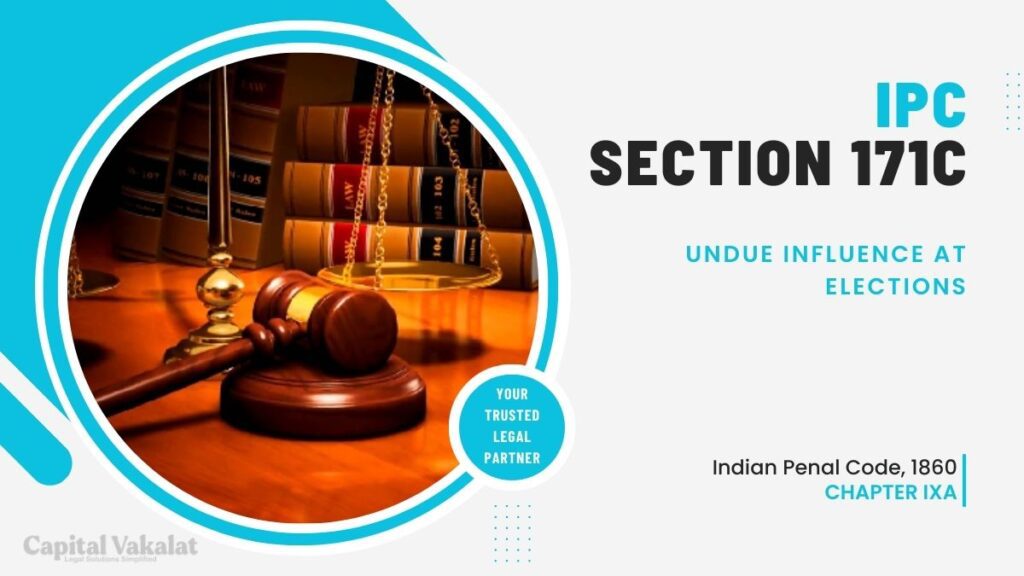Undue influence at elections is a topic of significant importance, as it strikes at the heart of democracy. The Indian Penal Code (IPC) addresses this issue through Section 171C, which is a crucial legal provision in the electoral landscape of India.

In this article, we will explore the nuances of Section 171C IPC, its historical context, and its impact on democracy.
Understanding Undue Influence at Elections
Undue influence in the context of elections refers to any act that threatens or manipulates a voter’s free choice. It’s the use of coercion, bribery, intimidation, or any other unethical means to influence a voter’s decision. The concept is aimed at ensuring that elections are free and fair, allowing voters to exercise their franchise without any external pressures.
The Legal Framework
Key Provisions of Section 171C
Section 171C of the IPC is the primary law dealing with undue influence at elections. It outlines various activities that are considered illegal, including threatening or causing harm, bribery, or undue influence on any person to vote or refrain from voting.
Penalties for Violation
Those found guilty of violating Section 171C can face imprisonment for a term that may extend to one year or a fine, or both. This legal provision is designed to act as a deterrent against any form of undue influence during elections.
Historical Context
Undue influence at elections has been a concern for as long as elections have existed. In India, this problem dates back to the pre-independence era when colonial powers used various tactics to manipulate the electoral process. The introduction of Section 171C was a significant step in addressing this issue.
Examples of Undue Influence
Voter Intimidation
Voter intimidation is a common form of undue influence. Threats of violence, harm to one’s reputation, or any form of coercion can dissuade voters from exercising their choice freely.
Distribution of Gifts and Money
Candidates or their supporters sometimes distribute gifts, cash, or other incentives to voters, thereby swaying their decisions. This practice is a direct violation of Section 171C.
Challenges in Enforcing Section 171C
Enforcing Section 171C poses several challenges. Often, evidence is hard to come by, and witnesses are reluctant to testify due to fear of retribution. This makes it difficult to prosecute individuals engaging in undue influence.
Recent Developments and Amendments
Over the years, there have been amendments and efforts to strengthen Section 171C. The aim is to make the legal framework more effective in countering undue influence.
The Role of Election Commission
The Election Commission plays a pivotal role in ensuring free and fair elections. It collaborates with law enforcement agencies to monitor and curb any undue influence activities during the electoral process.
Impact on Democracy
Undue influence can have a severe impact on the democratic process. It can distort the will of the people, leading to the election of candidates who do not truly represent the voters’ choices.
Preventive Measures
Voter Education
One way to counter undue influence is through voter education. Educated voters are less likely to succumb to manipulative tactics and are more likely to make informed decisions.
Surveillance and Reporting Mechanisms
Effective surveillance and reporting mechanisms can help in identifying and prosecuting individuals engaged in undue influence. Encouraging people to report such activities is crucial.
International Perspective
Several countries around the world have similar laws and regulations to counter undue influence during elections. The global community recognizes the importance of free and fair elections in upholding democracy.
Conclusion
In conclusion, Section 171C IPC serves as a significant legal safeguard against undue influence at elections. It ensures that the electoral process remains democratic, transparent, and unbiased. However, challenges persist in enforcing this law effectively. To protect the sanctity of elections, it is imperative for all stakeholders, including the Election Commission, civil society, and citizens, to work together to combat undue influence actively.
Frequently Asked Questions
What are the penalties for violating Section 171C IPC?
Violators of Section 171C can face imprisonment for up to one year, a fine, or both.
How can voters protect themselves from undue influence?
Voters can protect themselves by being well-informed, reporting any suspicious activities, and participating in voter education programs.
What role does the Election Commission play in countering undue influence?
The Election Commission collaborates with law enforcement agencies to monitor and curb undue influence during elections.
Is undue influence a global issue?
Yes, several countries have similar laws to combat undue influence at elections, emphasizing the importance of free and fair elections worldwide.